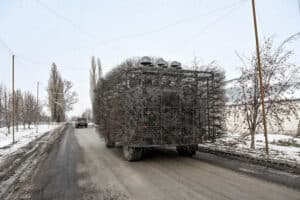Ministers of the opposition parties won’t give in to thugs demanding protection money – and neither should the government.

Protection fees and the construction mafia are not new in South Africa – it’s just that the authorities pretend they did not know about it.
They knew illegal migrants in the streets of Johannesburg and surroundings had been paying bribes for years to greedy members of the Saps.
The thugs had learnt the trick from the police officials.
ALSO READ: Five suspects arrested for alleged construction mafia activities in KZN
They harass foreigners and ask for bribes if someone was found without the necessary documents to be in SA.
The victims are mostly unemployed young men who sit on the side of the streets in most suburbs and outside shopping centres, seeking piecework such as painting, bricklaying, gardening, plumbing and even some electric maintenance.
Unscrupulous police members often raid the spots and demand a protection fee, ranging from R20 to R200, with the most common fee being R50.
They are being “protected” from prosecution for being in the country illegally without documentation and to avoid being sent away to await deportation to their countries of origin.
Charging a protection fee is not limited to police, but thugs countrywide. We read numerous reports about how residents in Mthatha and its surrounding villages in the Eastern Cape are living in fear of being attacked by thugs who demand protection fees.
In many instances, residents were taking revenge against the attackers, who demand fees from residents and motorists for looking after your house, your business, your car, your animals and even your family.
This is regardless of whether you want to be protected or not. The spaza shops owned by Pakistanis and Ethiopians are also targeted.
ALSO READ: ‘Sparks will fly’: Mchunu on construction mafia, extortion investigations
The crime in the eastern part, previously known as Transkei, spread from the Western Cape to which Transkei provided the most migrant workers to the Cape for generations.
Those fleeing the long arm of the law in the Cape return to their rural homes in the Eastern Cape to continue with their evil acts in the villages.
During my visit to Cape Town recently, I was warned never to visit the townships, especially Khayelitsha, where this problem has spiralled out of control.
There residents are charged protection fees for walking in the street and schoolchildren pay thugs who lurk outside school. Refusing is an invitation to be shot.
A teacher was recently shot dead in Khayelitsha after dropping her kids at school because she had no money to pay the thugs.
An Uber driver showed me a spot in Elsie’s River, a coloured township, where a group of foreign tourists were mugged after their vehicle tyre punctured.
They were robbed of their cellphones, jewellery, cameras and other expensive items. One tourist of stripped of his new brand-name tekkies and tracksuit.
ALSO READ: ‘Boko Haram’ in Mamelodi: Brazen mafias embracing extortion terror tactics
There is no real difference between the individual thugs who demand protection fees from residents and the construction mafia members.
The principle is the same, except that in the construction sector, the thuggery is on a grand scale and involves millions of rands demanded from firms doing business.
The common fee charged is 30% of the income, which has forced many small businesses to close shop as they could not afford the fee.
It is amazing that those who ruled this country for the last 30 years have only begun to wake up to this problem.
Why do they pretend they’re not aware of it?
Maybe the government of national unity is a blessing because it brought us members of the opposition parties as ministers who have no vested interests in this crime.
They are not prepared to cave to the criminals – and that is what a government should do.
Support Local Journalism
Add The Citizen as a Preferred Source on Google and follow us on Google News to see more of our trusted reporting in Google News and Top Stories.






